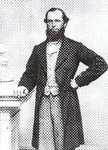Keywords: Reform
- Historical Items (53)
- Tax Records (0)
- Architecture & Landscape (0)
- Online Exhibits (38)
- Site Pages (9)
- My Maine Stories (4)
- Lesson Plans (0)
Site Pages
These sites were created for each contributing partner or as part of collaborative community projects through Maine Memory. Learn about collaborative projects on MMN.
Site Page
Life on a Tidal River - Bangor and Social Reform Movements of the 1800s-1900s
"Bangor and Social Reform Movements of the 1800s-1900s Text by The 7th Grade Maine Studies Students of the William S. Cohen School."
Site Page
Historic Clothing Collection - 1910-1920 - Page 1 of 2
"… simplification was influenced by the dress reform movement’s revival of the short waist bodice, tubular silhouette (last popular in the early…"
Site Page
Thomaston: The Town that Went to Sea - Prison is Established - 1823
"He had a great interest in the reformation of criminals and became very involved in the layout of the new prison."
Site Page
Life on a Tidal River - Exhibits
"The twelfth exhibit, Bangor and Social Reform Movements of the 1800s-1900s, was created during the 2016-2017 school year."
Site Page
View collections, facts, and contact information for this Contributing Partner.
Site Page
Historic Clothing Collection - 1910-1920 - Page 2 of 2
"… provide further examples of this high waist reform style, which also reflects aspects of the influential French designer Paul Poiret’s work."
Site Page
Historic Hallowell - Values and Charity
"… right on all occasions,” they did act on their reform impulses. The first Anti-Slavery Society in Maine was organized here in 1833, and a…"
Site Page
The Freedom & Captivity digital collection in the Maine Memory Network, and the complete digital archive housed at Colby Special Collections, is a repository of personal testimonies, ephemera, memorabilia, artifacts, and visual materials that capture multiple dimensions of the experiences of incarceration for individuals, families, and communities, as well as for survivors of harm.
Site Page
Blue Hill, Maine - Discover the Story of Blue Hill - Page 2 of 4
"… included eight columns 28 feet long for the Dutch Reformed Church in New York, stone for a bridge in St."









